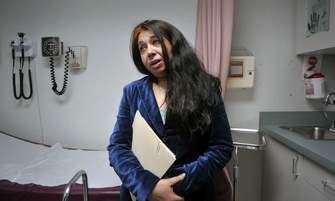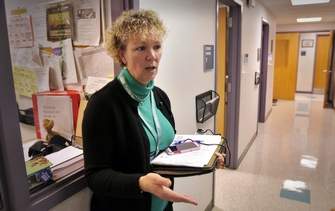Return to list
Filling a medical need: Growth of urgent care centers follows a national trend
December 28, 2014

Family physician Dr. Monisha Sarin talks during an interview at the Walk
In Center for urgent and primary care at the Family Health Center of
Worcester on Wednesday, Dec. 3, 2014. (T&G Staff/PAUL KAPTEYN)

Noreen Johnson Smith, vice president of development and advancement at
Family Health Center of Worcester, talks during an interview at Family
Health's Walk In Center for urgent and primary care in Worcester earlier
this month. (T&G Staff/PAUL KAPTEYN)
Urgent care centers — filling a gap between primary care doctors and
hospital emergency rooms — are expanding rapidly in Central
Massachusetts. Some are for-profit, some are nonprofit, but all offer
expanded hours on nights and weekends to help people deal with
emergencies — cuts, sprains, broken bones, flu symptoms, X-rays, some
medical tests, stitches, and more — that might normally be dealt with in
an emergency room, especially during off-hours.
Reliant Medical Group in Worcester opened two ReadyMED urgent-care
locations in the past 18 months, at prominent retail locations in
Shrewsbury and Auburn. Reliant plans to open three more in and around
Worcester, company officials said.
Doctors Express, a national for-profit chain of urgent care
centers, has opened 12 locations in Massachusetts since 2010, and most
recently an urgent care center in Marlboro.
Family Health Center of Worcester, a nonprofit organization,
operates an urgent care center in the former City Hospital property on
Queen Street in Worcester. HealthAlliance Hospital announced in July
that it would open an urgent care center on North Main Street in
Leominster, but that plan is apparently on hold. And recently,
Harrington HealthCare announced that it will open an urgent care center
next year on Route 20 in Charlton.
The growth of urgent care centers here follows a national trend.
Since the early 1980s, urgent care centers have been operating
in the U.S., but their growth has exploded lately. The industry now has
between 4,000 and 9,000 facilities across the country, according to the
Urgent Care Association of America, the industry's trade association.
Convenience and lower cost are considered as two important facts that help the urgent care centers expand.
"You make a phone call, schedule an appointment, take a day off
from work and go sit in the waiting room, " said Eric Buehrens, the
Chief Operating Officer of Reliant Medical Group, describing the old way
of getting treated in America. "This is not the way business is being
done in the 21st century."
Similar to emergency rooms, patients don't need appointments to see a doctor in urgent care centers.
"If you wake up sick in the morning and you can't get to see
your doctor, you can come here and get the visit in the same day," said
Noreen Johnson Smith, the vice president of development and advancement
at Family Health Center of Worcester.
The average time patients spent waiting in the emergency room
before being seen by a doctor was 36 minutes in Massachusetts during
2013, which ranked as the fourth longest wait time in the U.S.
The wait time is 45 minutes in the emergency room at UMass
Memorial Medical Center, and 29 minutes at Saint Vincent Hospital,
according to ER Wait Watcher by ProPublica, an app analyzing 2013 data
collected from the federal Centers of Medicare & Medicaid Service.
The average wait time at a Doctors Express clinic is under 10 minutes, the company claimed on its website.
Focusing on medical care that requires immediate attention but
is not life-threatening, "urgent care centers allow emergency rooms to
serve true emergencies, and its average discharge time is under one
hour," wrote Lisa Salerno, the associate vice president of health care
practice at Rasky Baerlein, a Boston public relations firm, in an email.
Besides same-day visits, patients can ask for medical help
anywhere through an online electronic portal MyChart offered by Reliant
Medical Group.
"I think this (electronic visit) is a way that a lot of people
want to deal with their medical care these days and it's something that
we hope to expand in the future," said Mr. Buehrens.
Urgent care centers typically cost patients less than an
emergency room visit because insurance companies charge a lower
co-payment for an urgent care visit. The lower co-payment is possible
because the urgent care center is likely to bill the insurance company
less than the emergency room. A patient can also save money by going to
the less expensive urgent care center when he exceeds his insurance
policy if it has a high deductible and he becomes responsible for the
full cost of the service.
For patients with Blue Cross Blue Shield Insurance, the co-pay
for a visit to emergency room is $100, while the co-pay is $10 or $20 at
Family Health Center. For patients with MassHealth, a publicly run
state medical health plan, there is no co-pay, according to Dr. Monisha
Sarin, a doctor who has been working in Family Health Care of Worcester
for 12 years.
"It's an umbrella for all state-sponsored health insurance," said Dr. Sarin.
High-deductible health plans are becoming more common.
Sixty-seven percent of employers offer high-deductible health plans, and
47 percent offer plans compatible with health savings accounts that can
receive both employer and employee contributions according to a report
from PricewaterhouseCooper's Health Research Institute in September
2014.
"As a shrewd consumer, wouldn't you choose to visit an urgent
care center like ours for non-life threatening conditions?" said Bing
Yeo, the managing director at Doctors Express, who was confident to say
that the bill in an emergency room would be five to six times higher
than the bill from Doctors Express.
As a for-profit business without funding from government,
Doctors Express Urgent Care Centers have the right to pick patients. The
chain does not accept all kinds of MassHealth, the state-sponsored
health insurance for the poor. But it does accept Medicaid offered by
Fallon Health, Neighborhood Health and Network Health, according to Mr.
Yeo.
By contrast, hospitals are legally obligated to treat everyone,
regardless of whether they have health insurance. Hospital emergency
rooms do not require patients to pay upfront for care.
For patients without insurance, Doctors Express Urgent Care
Centers charge a flat fee of $149 for a regular visit, which includes
X-ray and some in-house labs.
Nationally, an urgent care center performs an average of 342 exams a week, according to the Urgent Care Association of America.
"Urgent care is a low-margin, high-volume proposition,"
according to a recent story on urgent care centers in The New York
Times.
At $149 per visit at Doctors Express, and with the national
average of 342 visits a week, "the money starts to add up," the article
stated.
For Reliant Medical Group urgent care centers, the goal is to
keep patients out of very expensive and inappropriate locations for
receiving care.
"In particular, to keep our patients away from the emergency rooms," Mr. Buehrens said.
Dr. Sarin, at Family Health Center, recalled one patient coming with a huge bill from the emergency room.
The patient was a refugee, who was sent to an emergency room as soon as he landed in America for the first time.
"He gave me a bill, asked me 'What do I do with this bill?'" said Dr. Sarin, who originally from New Delhi, India.
Dr. Sarin gave the $3,000-plus bill to a benefit advisor at
Family Health Center, who talked to the hospital and found the patient
was qualified for MassHealth. The hospital, UMass Memorial Medical
Center, will directly bill the state insurance, according to Dr. Sarin.
"But that was a wake-up call to see, 'Oh my God, he cost the ER three thousand dollars,'" said Dr. Sarin.
Though competing against emergency rooms with more convenience
and lower-cost, the urgent care centers cooperate with emergency rooms.
"We work closely with the emergency rooms in Worcester," said
Mr. Buehrens. He explained that there are certain circumstances that
patients need to go to emergency rooms, though its main goal is to keep
patients away from the emergency room when patients have a routine
illness or injury.
As a long-time doctor in the urgent care center in Family Health
Center of Worcester, Dr. Sarin said they have a very good relationship
with the emergency rooms.
"We take the business they (emergency rooms) don't want," said Dr. Sarin. "The doctors at UMass Memorial know our names now."
Simeng Dai
Worcester Telegram & Gazette
2014 News










